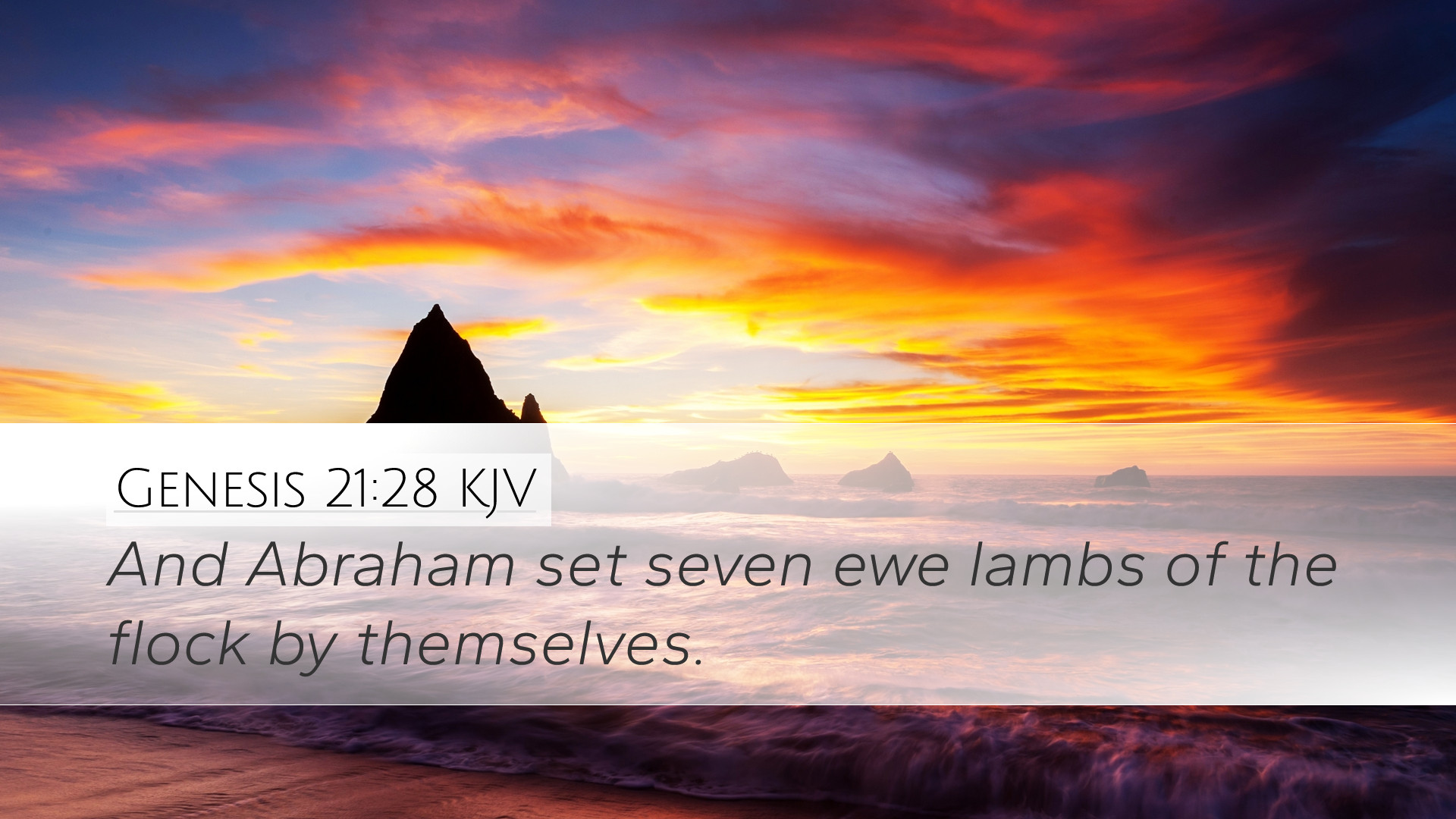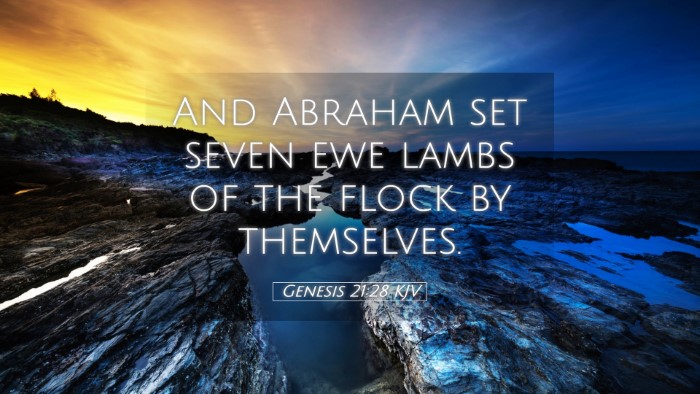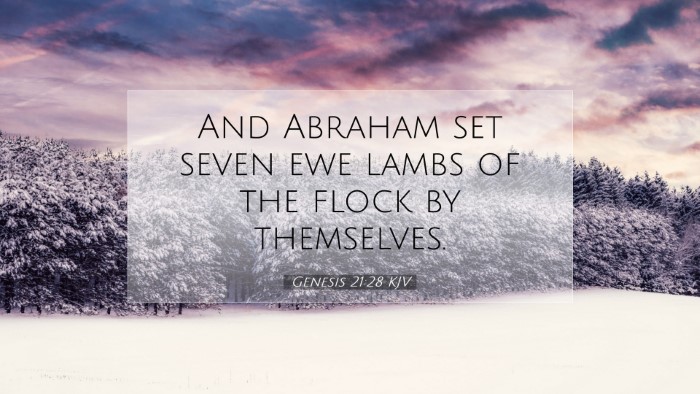Commentary on Genesis 21:28
Genesis 21:28 states: "And Abraham set seven new lambs of the flock by themselves." This verse, while seemingly simple, unpacks numerous theological, historical, and practical implications that are essential for a comprehensive understanding.
Contextual Background
To appreciate the full significance of this verse, one must consider its context within the narrative of Genesis. Abraham, the patriarch of Israel, embodies faith and obedience to God. This chapter highlights the ongoing relationship between Abraham and Abimelech, a Philistine king, indicating the importance of covenants in the biblical tradition.
Abraham's Interactions with Abimelech
The previous chapters set the stage for the conflict over the wells of water. Abimelech had taken Abraham's wife Sarah, believing her to be Abraham's sister. However, God's intervention protected Sarah and restored her to Abraham. Following this incident, we find Abraham reaffirming his commitment to resolve conflicts honorably.
The Significance of the Seven Lambs
In this verse, the seven lambs signify a formal action by Abraham to cement a covenant of peace with Abimelech. The number seven often denotes completeness and perfection in biblical literature, symbolizing a complete and satisfactory gift aimed at reconciliation.
- Symbolism of Sacrifice: The act of setting aside seven lambs is a gesture of sacrifice. Abraham acknowledges the gravity of the situation, recognizing the need for restoration of relations with Abimelech.
- Emphasis on Peace: This act illustrates the importance of making peace with one's neighbors, a principle that resonates throughout the scriptures. Abraham's proactive approach serves as a model for how to seek reconciliation.
- Covenantal Implications: The lambs represent a tangible offering that solidifies the relationship between the two parties. It points to the broader theme of covenants in the Bible, foreshadowing the ultimate covenant in Christ.
Theological Reflections
The act of setting apart the lambs carries rich theological implications. It emphasizes God's providence and highlights themes of sacrifice and atonement.
- God's Provision: The lambs serve as a reminder of God’s provision for His people. Abraham’s willingness to offer them reflects an understanding of God’s earlier provision in granting him a son, Isaac, who was born despite Sarah's barrenness.
- Foreshadowing of Christ: The seven lambs can also be viewed through a Christological lens as emblematic of Jesus, the Lamb of God, who takes away the sin of the world. Each lamb denotes the perfect sacrifice required for reconciliation between God and humanity.
- Personal Responsibility: Abraham’s initiative to provide an offering reflects the need for personal responsibility in relationships. This action enhances the understanding of how one's actions can foster peace or conflict.
Insights from Public Domain Commentaries
Matthew Henry's Commentary
Henry notes that Abraham’s offering of the lambs was an act of faith, demonstrating his acknowledgment of God’s covenant faithfulness. He emphasizes that the number seven indicates the completeness of the transaction, suggesting that Abraham intended to provide satisfaction to Abimelech.
Albert Barnes' Commentary
Barnes highlights that these lambs were symbols of peace and were necessary for the establishment of a treaty between Abraham and Abimelech. He points out that such agreements in ancient Near Eastern cultures often required animal sacrifices, underscoring the cultural context in which this event occurred.
Adam Clarke's Commentary
Clarke elaborates on the significance of the lambs, indicating that they symbolize Abraham's desire to be seen as a blameless and upright man. This offering was a means for him to clear any misunderstandings regarding his previous interactions with Abimelech, affirming that his intent was never malicious.
Practical Applications for Today
For pastors, students, and theologians, Genesis 21:28 serves as a powerful reminder of the importance of reconciliation and peace-building. The act of Abraham setting apart the lambs can inspire contemporary believers to view relationships through the lens of covenant and commitment.
- Encouragement to Pursue Peace: Just as Abraham made a concerted effort to resolve conflicts, modern believers are called to actively pursue peace in their relations with others.
- Understanding Sacrifice: The act of offering something valuable for the sake of reconciliation should prompt believers to consider what they might need to sacrifice in order to build and maintain healthy relationships.
- Living as a Covenant Community: This passage encourages the church to embody the principles of covenant living, where members seek mutual support, understanding, and reconciliation reflecting the character of Christ.
Conclusion
Genesis 21:28, although a brief text, evokes profound thoughts on covenant, sacrifice, and the pursuit of peace. Through insights drawn from classical commentaries and reflections on contemporary application, this passage transcends its historical context to speak directly to the hearts of today’s believers. Whether in a leadership capacity, academic study, or personal reflection, the themes found in this verse encourage us to ask how we can cultivate an atmosphere of peace in our communities and relationships, ultimately reflecting God’s covenant nature.


